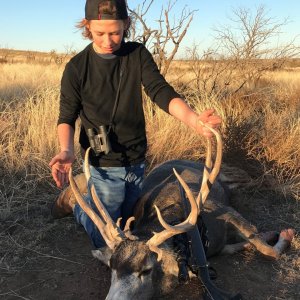backinthegame
Active Member
- Messages
- 754
Good afternoon folks...
Since we're in the midst of the Utah Big Game draw frenzy, I decided to make a call to the DWR to get some clarification in regards to how the actual drawing process takes place in terms of how your points "help" you in drawing a tag...
Obviously we all understand the bonus tags...50% of the tags are alloted to max point holders.
But how many of us understand how your points help your chances of drawing one of the non-bonus tags? I'm sure there are plenty out there who do understand the process, but I'd venture to guess there are plenty of us out there who don't quite understand how the process works out.
So here we go...
Say you've got 5 points, which is below max for your specific hunt species and unit. You are out of the running for bonus tags, but you're in for the randon tags. Call me an idiot, but I've been under the impression that would mean that your name goes "into the hat" 5 times...this is incorrect.
Your 5 points actually allow you to receive 5 different "draw numbers". These draw numbers are assigned at random and are what represent you as Joe Hunter when it gets to the nitty gritty and comes time to draw tags. With your 5 points, you get 5 numbers. The lowest of the 5 numbers becomes "your" number...your 5 points don't get you into the draw five times, insted they allow you five chances are pulling a low "draw number".
Now, once you've got your draw number it goes in as "you" in the actual tag drawing. Having a low number is an advantage, but not because they draw all the low numbers first...instead of drawing in order of number...1,2,3,4, etc...the computer system running the draw runs off an algorithm that assigns more "weight" to the low numbers. Meaning a lower draw number has a greater chance of coming up than a higher number but not that a lower number is guaranteed to come up before a high number. For example, If your draw number is number 1 you have a better chance of having that number come up before someone with a draw number of 25, but it is not guaranteed that your low number will be drawn before a high draw number.
The whole process is, not really surprisingly, somewhat complicated.
Your points do help, but they get watered down a couple times throughout the process. It would seem logical that if you have 5 points that your name should go into the draw five times (or more accurately six, 5 for your points and once for this year's app) ...likewise, someone with 10 points would go in 10 (11) times and someone with 0 points would go in once (for this year's app). That would give someone with 5 points roughly five times the chance of drawing that someone with 0 points.
Instead though, your 5 points gives you five chances at a low draw number, and then the computer algorithm gives you a more heavily weighted chance of drawing a tag if your 5 points allowed you to be assinged a low draw number.
I've tried to explain the whole process as best I can, hopefully it doesn't sound like total gibberish...hopefully it clears up some confusion about how the drawing takes place in regards to points.
I do wonder why the process is complicated to the point it is when it seems much more intuitive (at least to me) to simply put a guy with 5 points into the draw five (six) times, a guy with 10 points in 10 times (11) and a guy with 0 points once. Someone much smarter than me might have the answer to that!
Thoughts?
Since we're in the midst of the Utah Big Game draw frenzy, I decided to make a call to the DWR to get some clarification in regards to how the actual drawing process takes place in terms of how your points "help" you in drawing a tag...
Obviously we all understand the bonus tags...50% of the tags are alloted to max point holders.
But how many of us understand how your points help your chances of drawing one of the non-bonus tags? I'm sure there are plenty out there who do understand the process, but I'd venture to guess there are plenty of us out there who don't quite understand how the process works out.
So here we go...
Say you've got 5 points, which is below max for your specific hunt species and unit. You are out of the running for bonus tags, but you're in for the randon tags. Call me an idiot, but I've been under the impression that would mean that your name goes "into the hat" 5 times...this is incorrect.
Your 5 points actually allow you to receive 5 different "draw numbers". These draw numbers are assigned at random and are what represent you as Joe Hunter when it gets to the nitty gritty and comes time to draw tags. With your 5 points, you get 5 numbers. The lowest of the 5 numbers becomes "your" number...your 5 points don't get you into the draw five times, insted they allow you five chances are pulling a low "draw number".
Now, once you've got your draw number it goes in as "you" in the actual tag drawing. Having a low number is an advantage, but not because they draw all the low numbers first...instead of drawing in order of number...1,2,3,4, etc...the computer system running the draw runs off an algorithm that assigns more "weight" to the low numbers. Meaning a lower draw number has a greater chance of coming up than a higher number but not that a lower number is guaranteed to come up before a high number. For example, If your draw number is number 1 you have a better chance of having that number come up before someone with a draw number of 25, but it is not guaranteed that your low number will be drawn before a high draw number.
The whole process is, not really surprisingly, somewhat complicated.
Your points do help, but they get watered down a couple times throughout the process. It would seem logical that if you have 5 points that your name should go into the draw five times (or more accurately six, 5 for your points and once for this year's app) ...likewise, someone with 10 points would go in 10 (11) times and someone with 0 points would go in once (for this year's app). That would give someone with 5 points roughly five times the chance of drawing that someone with 0 points.
Instead though, your 5 points gives you five chances at a low draw number, and then the computer algorithm gives you a more heavily weighted chance of drawing a tag if your 5 points allowed you to be assinged a low draw number.
I've tried to explain the whole process as best I can, hopefully it doesn't sound like total gibberish...hopefully it clears up some confusion about how the drawing takes place in regards to points.
I do wonder why the process is complicated to the point it is when it seems much more intuitive (at least to me) to simply put a guy with 5 points into the draw five (six) times, a guy with 10 points in 10 times (11) and a guy with 0 points once. Someone much smarter than me might have the answer to that!
Thoughts?












